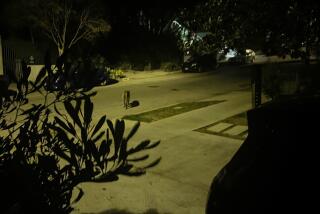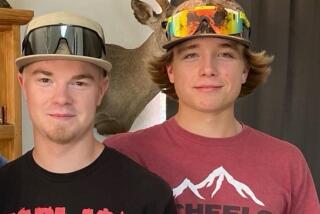Victim’s Family Carries On for Kids
- Share via
Reporters write so often about tragic death that it’s impossible to remember every case. Some fade from memory; others stick with you long after the interview is over and the story is written.
I’ve sat with grieving friends or relatives in too many living rooms, notebook in hand and with hurt hanging in the air like an oppressive tropical heat. It’s no cliche to say you feel their pain. When strangers begin crying in your presence, you don’t wall that off.
Then, every so often, the nature of someone’s death is so off the probability charts, such a cruel twist of fate, that you wonder how in the world the grieving parties will ever bounce back.
I’m here to report that they do. Somehow, some people find a way to emerge from the sea of pain instead of being engulfed.
An e-mail Tuesday from Dona Reynolds reminded me of that. You want to talk pain? You want to talk off the charts?
Reynolds lives in St. Joseph, Mo., and from 1,700 miles away found out last January that her son Mark, 35, had been attacked and killed by a mountain lion in Whiting Ranch Wilderness Park in Orange County. Dona Reynolds probably never heard of the park, or, like most of us, had a clue that mountain lions killed people in this country.
The reality, however, was that one killed her only son. So what did she and her husband, Gary, do? Curse the fates? Lose themselves in grief? Hate the world?
If they did, it didn’t last. The family is making plans to continue a private, pet project of Mark’s, who was an avid cyclist: to buy and donate bicycles to kids who couldn’t afford them.
It’s a small, undramatic gesture. Not likely to generate many headlines, it has only one conceivable goal: to make youngsters, most if not all strangers to the Reynolds family, happy.
In seeking peace from Mark’s death, the Reynolds family didn’t overreach. They simply remained true to his heart.
Sharon Richards worked with Mark for more than a year and, like some others at OMS Sports in Anaheim, didn’t learn until after his death about his private pastime.
“He’d call his buddies and say, ‘I need everyone to give me a hundred bucks, and he’d then take $1,000, $1,200 or $1,500 and buy bikes and helmets for kids who otherwise wouldn’t have the money for it,” Richards says.
The family hopes to buy bikes in Southern California, Missouri and Colorado Springs, Colo., where Mark once lived. They’re shooting for a Christmas-season program.
“Everybody remembers getting their first bike and what a joy that was,” Richards says. “As grown-ups, we look back and think what we felt like or what we saw in a child’s eyes the first time they got a bicycle.”
Richards says she has spoken occasionally since Mark’s death with his mother. “She’s told me lots of times she’ll get really frustrated and just want to give up,” Richards says of Mark’s mother, “but every time that happens, she says she feels Mark giving her a little shove and saying, ‘You’re not going to give up.’ One of her greatest helps she has now is carrying on Mark’s legacy in handling this bicycle fund.”
I reached Dona Reynolds in Missouri, but she didn’t want to talk until later in the year about the bicycle project in Southern California.
Fair enough. Her family has been rocked by a bizarre, improbable tragedy.
It seems that generosity, not bitterness, was left in its wake. A hint as to why may lie in the contents of a note Mark’s sister Terri sent me months ago. “He would do anything for anyone to try to make their day. He would ask, ‘Do you need a hug today?’ And even if you replied no, if he thought you were having a bad day, you got a hug!”
A tragedy without a desperate ending. That inspiring legacy guarantees that the Mark Reynolds story will be told for years to come.
*
Dana Parsons’ column appears Wednesdays, Fridays and Sundays. He can be reached at (714) 966-7821 or at dana.parsons@latimes.com. An archive of his recent columns is at www.latimes.com/parsons.









